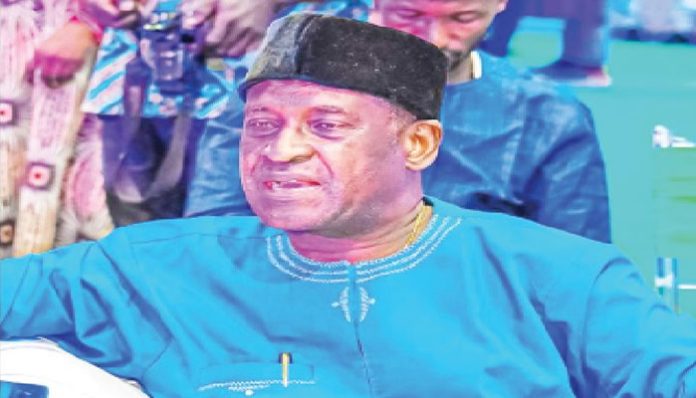

The Association of Housing Corporations of Nigeria’s President, Eno Obongha, speaks on industry issues with JOSEPHINE OGUNDEJI, including the nation’s persistent building collapse
How would you access Nigeria’s housing sector?
There is a housing deficit gap in Nigeria, which is very controversial. Some people are saying that many houses are available and are not occupied, so by and large there is a gap, but I think more is on affordability. There are houses, but many of them are not taken because people cannot afford them.
What is the way forward for bridging this affordability gap?
The Federal Mortgage Bank was set up to facilitate the ownership of housing in Nigeria, and that is why the National Housing Fund was established. But what has happened is that very many people have not been captured in that National Housing Fund net, though the funds are not adequate for that purpose. I have seen some of the efforts that have been made by the current government, particularly by the Minister of Housing, Ahmed Dangiwa.
Dangiwa was a former managing director of FMBN, which is the apex bank for the provision of housing in the country. The combination of his experience as the managing director of FMBN, and now being in the driving seat as the Minister of Housing is of immense advantage. And I think some of the steps he has taken are encouraging. So, we need to encourage him; it is not a day’s job. So, all hands must be on deck to reduce the housing gap.
There have been numerous reports of buildings collapsing and leading to the loss of lives in different parts of the country. What do you think is to blame for these tragedies?
First and foremost is the lack of proper regulatory policies and the implementation of such policies. Somebody can go to the town planning office and get approval to build a bungalow, and by the time you get there, you discover that instead of a bungalow, the person has built a two-storey building. In addition, somebody can again get approval to build a three-storey building, and by the time you go there, you see that he has built a six-storey building. This is because there is no proper regulation. Furthermore, in our market today, the building materials are not standard. So, there are fake materials in the market and there are no proper supervisions, nor are supervisions thorough, and supervisors may cut corners.
People should take responsibility; contracts are being given to people anyhow. It should be ensured that those who are involved in storey building are properly certified. The supervision and regulation are very poor because people cut corners.
Nigeria currently has a housing deficit of about 28 million units. What has been the primary factor behind this deficit and how can it be bridged?
If you go to Abuja, you will find so many unoccupied housing estates, hence, there is the question of both availability and affordability, and this is why I said the topic of the housing gap in the country is controversial. There are unoccupied houses and we are saying we have a housing gap. So if you aggregate the houses that have been built and are unoccupied, you will realise that those houses are big housing projects going to the tune of millions. Hence, people cannot afford them. There should be a way for affordable houses to be available to the common man. Also, Dangiwa came up with the rent-to-own scheme, which is a beautiful angle introduced, and his appointment is one of the best decisions that has happened to Nigeria.
With the growing Nigerian housing deficits and high interest rates, accessing loans from mortgage institutions is not an easy task for real estate investors. What is the way forward for real estate investors?
FMBN charges in one digit between six per cent and nine per cent over a long period. However, the funds available to FMBN are inadequate because so many people who would have contributed are not captured and are not paying. Some deductions are made and are not remitted to FMBN, and the law of FMBN is obsolete. The NHF was established in 1992, which is not a good one, because there are legal obstacles.
How effective has the National Housing Fund been in providing affordable housing loans to low- and medium-income earners?
The FMBN has tried within its means. There is no state in the federation where the FMBN has not established homes, and there are different loan products offered by the FMBN in every state.
How can mortgage schemes be made more accessible in Nigeria?
There is a need for advocacy and there is a need to increase the financing capacity of the Federal Mortgage Bank of Nigeria because housing is a basic necessity of life, just like clothes. So, it should be well subsidised and the FBMN should be given some funding in addition to the other sources it has so that more people will access it. People should plan to leverage more of the mortgage system in the country. People want to be proud, and many wait until they have up to N15m to buy a fine house. This is not correct. Instead, you should consider a mortgage that may take a long time, perhaps 15 years, to finish paying off. Start with a one-bedroom home. As your situation changes, such as getting married or having children, you can upgrade to a larger home. This gradual progression is more practical than accumulating a large sum to buy a house outright.
The high cost of a mortgage has been the bane of real estate development in Nigeria for both those developing for private use and those developing for commercial purposes. How can mortgage schemes be made more accessible in Nigeria?
Everything has increased. A bag of rice that was about N30,000 is now about N70,000 and cement that was about N3,500 is now about N8,000 to N9,000. So, it will affect everything. Those who were able to access it before might not be able to access it again. Sometimes the pain could come on, but as time goes on, there will be a way out. Another thing is that we should not all depend on conventional building materials. We should also embrace local building materials because local building materials would make houses a bit cheaper. So, we should embrace local building materials to bridge the affordability gap. There are improved local building materials, but what we have is an ego problem. All we need is a functional house, and the price would be lower.
How can the Nigerian building industry use technologies and innovations to improve building safety and prevent collapse incidents?
If you go to Abuja, you will find an institution like the Nigerian Building and Road Research Institute, which has advanced machinery and new technologies. There are technologies from South Africa that are highly advanced, as well as other effective technologies from foreign countries that are well-protected and do not require adaptation. Rather than solely relying on these foreign technologies, the Nigerian Building and Road Research Institute has commendably utilised some of them to construct houses. It is a gradual process, but these technologies are being progressively embraced. This is why I emphasise the need for advocacy. We should also encourage the establishment of skills acquisition centres, where these new technologies can be introduced and adopted by our people.
What international best practices can Nigeria adopt to improve building safety and prevent collapse incidents?
Whenever a house collapses, a panel of inquiry is constituted to investigate the incident. This panel makes numerous recommendations. However, making recommendations is one thing, and implementing them is another. My suggestion is that the government should take these recommendations seriously, enact appropriate laws, and ensure their implementation.
Furthermore, there should be accountability. People should take responsibility for their actions. If an engineer designs a house and it collapses, their professional certification should be subject to sanction by the relevant professional body. There should be fines and other penalties.
It is not enough to simply design a house. If an engineer designs a building to be five stories tall and it ends up being eight stories, it shows a serious breach. The responsible parties should be held accountable. The owner and the contractor should be sanctioned if the construction deviates from the approved design. The design must match the final construction, especially for multi-story buildings.
What are the potential long-term consequences of an unchecked rental increase and escalating building material costs on the homeownership rate in the country?
The issue here is one of demand and supply. Over the years, demand for housing has been higher than supply. However, with initiatives like the Renewed Hope project and other efforts, many houses are being built, contributing significantly to supply. As more houses are added to the market, the laws of demand and supply will eventually balance out, leading to a decrease in housing prices. This will make homes more accessible to many people.
Instead of leaving these houses vacant, which attracts animals and rodents, it is important to ensure they are occupied. I do not want to mention states, but I have seen states where up to 400 houses have been built but remain unoccupied. States are building, the Federal Government is building, and private individuals are building. There is a national housing policy; states are domesticating their own, and the local government is keying into it. So, when all those steps are combined, you will see that there will be progress in this direction.
How can the government and regulatory bodies be held accountable for enforcing building codes and standards to prevent building collapse incidents?
The willpower should be there for sanctions and the implementation of those sanctions.
How can the government and regulatory bodies be held accountable for enforcing building codes and standards to prevent building collapse incidents?
When a building collapses, it brings pain, agony, and distress, as seen in recent incidents like the one in Jos. A building collapse is a significant loss, affecting not only the owner but also the victims. Often, workers may lose their lives. The impact is profound, and there is a need for empathy. Anger alone is not enough; the victims need support. For instance, in Jos, the governor’s wife visited the hospital to see affected families, sometimes covering medical bills. People can lose their children, parents, or other loved ones, making it a heartbreaking event. Such tragedies could have been avoided if proper measures were taken initially.
This underscores the need for government intervention, which does not always require new laws. Immediate, compassionate responses are crucial. Additionally, it is not only the government’s responsibility; other people should sympathise with and support those affected to help mitigate the impact of such calamities.
Join Television Nigerian Whatsapp Now
Join Television Nigerian Facebook Now
Join Television Nigerian Twitter Now
Join Television Nigerian YouTUbe Now





